High School Homeschool Curriculum: Top Picks
Ah…high school. Why do I love homeschooling high school so much? Mostly because my teens no longer need my constant attention and instruction. Ha!
While I’m not kidding about independent learning, there are other reasons I really enjoy the high school homeschool:
- We have great discussions.
- My children can (finally) logically defend issues near and dear to them.
- They can understand and handle more detailed world happenings that my husband and I worked so hard to shelter them from in the early years. As we focused on apologetics from the beginning, it’s been very cool to see them automatically look at world issues through “Biblical glasses.”
- I love walking beside them as they venture into the “real world.”
- Our relationships begin to shift from parent to friend slowly.
- I can trust them with more responsibilities.
- And to reiterate, I’m very serious about how refreshing it is that learning becomes more independent.
Above all, it fills me with joy to see the fruit of all the academic lessons, character training, life skills lessons, and Bible teaching come together to mold fantastic, capable young adults. Oh, and watching God reveal His purposes for my children’s lives is utterly amazing!
While my husband and I certainly don’t want to let go, this homeschooling thing makes it easier, I think. Knowing we’ve poured ourselves into their growing-up years and walked alongside them to the end gives us such peace. God is good to offer that kind of peace.
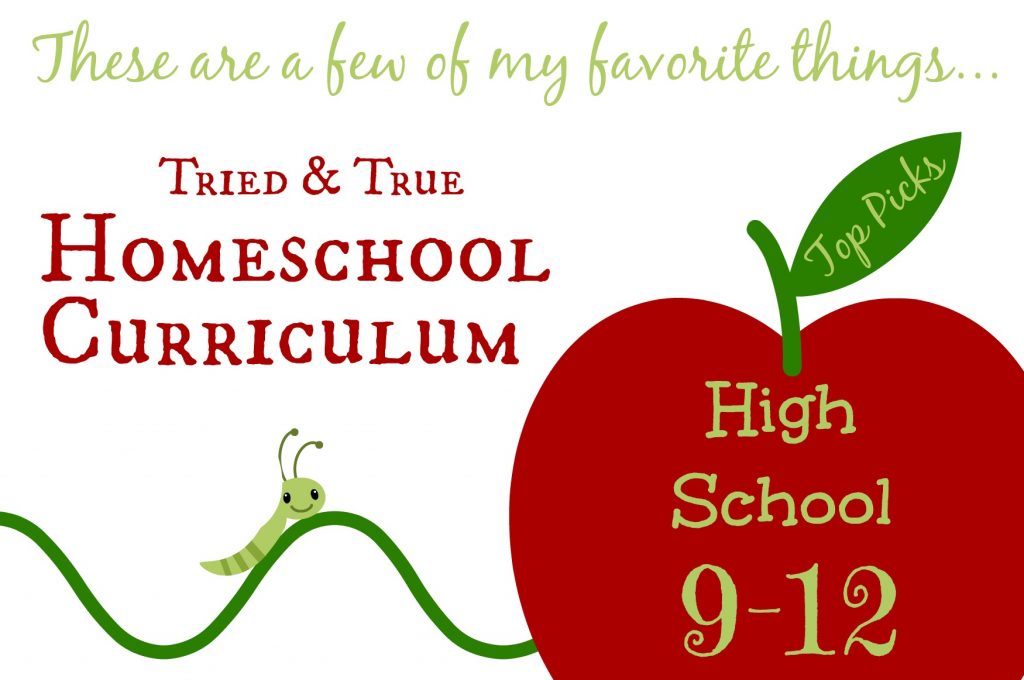
This post contains affiliate links.
High School Homeschool Curriculum
Alright, moving on from the mushy, gushy—below is my list of top picks for high school homeschool curriculum. We’ve used other materials and even made up some of our own. However, these have been and will be constants during our high school years in our homeschool.
Knowing we lean heavily on a Charlotte Mason style, you may be surprised to find many textbook-like resources on my list. As I’ve always said, just about any curriculum can be used in a Charlotte Mason manner. Any curriculum we’ve ever used, from preschool through 12th grade, has been tailored to fit our Charlotte Mason lifestyle. For the most part, though, most of the top picks below either utilize living literature (or are “living” in the text presented), are “gentle” in nature, and/or are concise enough not to waste our time.
Please thoroughly research my high school homeschool favorites to decide whether they should be your favorites too.
English
Wordsmith is meant for use with 7-9th graders. We tend to be very relaxed with writing instruction until high school. This super-easy-to-use curriculum is our top choice for the freshman year. The book begins by teaching writing techniques and ends with writing assignments in all genres. Most importantly for us, it’s very student-friendly and doesn’t require a ton of effort on the part of the parent. Feel free to check out my review.
I’m also a HUGE fan of using picture books to teach writing – even in high school! For more information, check out the Teaching Writing with Picture Books Homeschool Masterclass and Using Picture Books to Teach Writing Blog Series.
Learning Language Arts Through Literature: The Gold Books – American Literature and British Literature are excellent resources for knocking out two high school English credits. Both books include great lists of literature in various genres and all the thought-provoking activities that accompany them – vocabulary instruction, book analysis, writing assignments, and more. The assignments are fully prepared for you and can easily be completed by your independent student without additional instruction. (We don’t do every assignment because there are a lot.)
I’m also a big fan of the Beautiful Feet curriculum sets during high school. You’ll see them mentioned in more detail in the history section below, but they are also literature-based with plenty of opportunities for language arts credit.
History
Diana Waring’s History Revealed curriculum is excellent because it effectively meets the needs of all types of learners and accommodates individual student interests. Each book (Ancient Civilizations and the Bible, Romans, Reformers, Revolutionaries, and World Empires, World Missions, World Wars) is meant to last one year and can earn a full history credit. The books are arranged into chapters, each of which takes about a month to complete. During that month, your student will read text, live literature, research topics, complete writing assignments, pull together projects, and more.
It’s a very adaptable curriculum, and there are more ideas in each chapter than you can possibly use. You could easily complete more than expected in each chapter and take two years to complete a book, earning two history credits. Or, you could use the seemingly endless activity suggestions for other subjects (especially writing) and assign enough history and writing lessons to assign credit for history AND English in one year. You have to see this curriculum to believe it. You might get a slightly better picture of all it offers in my review.
(History Revealed is advertised for 5th-12th grades. We used the Ancient Civilizations and the Bible curriculum with an 8th and 5th grader. The 8th grader kept up well, but could have learned so much more if I had waited. The 5th grader went along for the ride but did not come close to reaping the full benefits of the curriculum.
The “A History of US” Series from Joy Hakim is another U.S. history resource that has fit well into our living literature approach to schooling. While the books are liberal at times (especially Book 10, which covers modern times), we have found them to be fabulously interesting overall. Some curriculum supply companies include these books for much younger ages, but I’ve seen older students better absorb the information. At the high school level, you can have great discussions about the misconceptions – conversations you need to have. (I hesitated to recommend this series because Mom and Dad need to be aware that some liberal teachings must be refuted during family discussions and by reading other supporting resources, shared below.)
High school students can tackle several volumes per year. To round out the reading, I assign papers occasionally, and we have many family discussions. Of course, we do anytime we can tie in a good field trip or an excellent documentary, historical movie, or historical fiction. Oh, and I make sure a test follows each section!
Some books and DVDs we use to supplement this series and debunk liberal viewpoints include: American Heritage Series DVDs, How Should We Then Live? DVDs, Our Constitution Rocks, Constitutional Literacy DVDs, and For You They Signed. We often read and watch these together as a family, and in doing so, have great discussions about current-day misconceptions and worldviews. You might wonder what topics I’m specifically talking about as liberal…information about our Founding Fathers being deists, information about the Crusades being irrational, and viewpoints that Muslims aren’t inherently against Christians, among others.
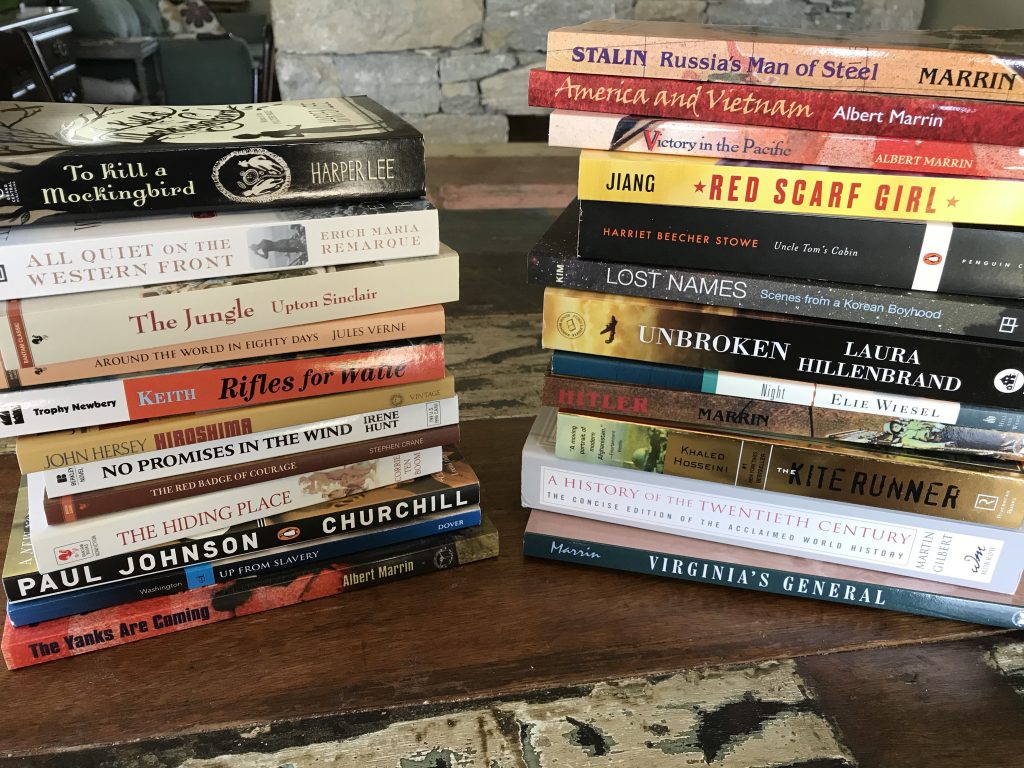
As different children come along, you sometimes find additional favorites that cover the same things as previous favorites. That’s the case with the Modern U.S. and World History from Beautiful Feet. It’s completely prepared for you!
This curriculum includes everything you need to teach high school history using living literature. It provides meaningful assignments that help students think critically about the topics presented in the books and some texts and links that tie the books to actual history. Ultimately, your child will earn a credit in history and literature! Feel free to check out my review.
Math
I like Saxon Math. My children…well, let’s just say they tolerate Saxon Math. It’s an excellent college-prep curriculum that teaches thoroughly and incrementally. When a student completes a Saxon book successfully, you don’t need to doubt they’ve received a solid math education. Since higher-level math can get a little dicey around here, Saxon Teacher CDs have been lifesavers for us!
Another cool thing about Saxon Math – according to the Saxon company, if you use their 3rd editions of Algebra 1, Algebra 2, and Advanced Math, enough geometry is embedded within the three to count as four math credits! Three books, four credits – what high school kid wouldn’t appreciate that??
Saxon Math is notorious for assigning lots of practice problems. We assign odds or evens. If those are done well, we move on. If those aren’t done well, we review the lesson the following day and use the other problems for practice.
If you have a child who just wants to get through algebra 1, algebra 2, and geometry, then Jacob’s Geometry is a great place to jump off the Saxon wagon. This is a straightforward, challenging, but not overwhelming geometry curriculum that we have loved. You can find real-life humor and the big picture in the lessons. Okay, maybe those things don’t make it painless – perhaps not enjoyable – but highly tolerable. As with Saxon, there are many opportunities to practice in each lesson. We never complete all the problems.
For kids who are ready to jump off the Saxon wagon before it ever gets moving, Teaching Textbooks and Thinkwell are excellent options. My boys have used at least some levels of both programs for upper-level math and have been very successful.
Science
Apologia Science is full of good stuff. It’s comprehensive, offering terrific labs that are mainly easy to complete at home (or find a demonstration video online), as well as challenging. My children might tell you the books are very challenging (especially chemistry and physics), but that’s what I expect from a solid college-prep science curriculum. Even better, they are God-honoring. I never have to worry about having to dispel incorrect teaching.
We’ve used Physical Science, Biology, Chemistry, and Physics during our high school years. One of my children completed Physical Science in middle school, which is where it is officially supposed to fit.
For children who don’t necessarily fit into the traditional high school textbook mold, you’ll appreciate the non-traditional biology and chemistry credits we’ve compiled. You might also like to see how you could create your very own science class without as much effort as you think. Ellen McHenry’s Basement Workshop curriculum has become a favorite for middle school and early high school students around here!
As a Charlotte Mason homeschooler, I must admit that turning science over to a textbook after many years of nature-based lessons, casual experimentation, and unit studies was/is hard. Here’s how I cope: We still try to include weekly nature walks and nature studies in our schedule. This “nature day” takes the place of the textbook. Yes, that means we don’t make it all the way through the textbook at the end of the year. That’s okay. I’ve found the last few chapters of each book to be almost too deep for my high schoolers, anyway. Continuing nature study is far more critical than finishing any science book!
Also, most of the time, we use narration for “check-ups” of comprehension rather than writing answers to the various question points in the book. I also try to tie in a field trip, living biography, or excellent documentary to round out the textbook feel.
Government
American Government in Christian Perspective from A Beka is one traditional textbook curriculum my children and I have loved from start to finish. It’s thorough, God-honoring, and concise. Even better, it’s efficiently completed in one semester.
Bible
In high school, we make time to learn about the various religions around the world and the differences between Christian denominations. It’s of great importance to my husband and me that my kids know how to defend their Christianity in a world that will try to confuse them at every turn. These two pamphlets from Rose Publishing provide a solid foundation for our research and study.
The Christianity, Cults & Religions and Denominations Comparison pamphlets don’t tell you everything you need to know. However, they are a non-intimidating method that piques interest and understanding before we dive deeper into research and the Word. Whether you want to dive deeper or not, these pamphlets (especially the one on world religions/cults) are fabulous, quick-reference guides!
Electives
Economics for Everybody has taught me as much as it has taught my children. This is an incredible video-based survey of economic principles that I wish were required for every high schooler across the country. The focus is on a Christian worldview of economics with solid training about the importance of a free-market economy.
It’s easy to complete in one semester, but there are plenty of extras to extend over a year if you prefer. The study guide offers numerous valuable discussion opportunities and thought-provoking writing experiences. Learn more in my review.
The world of psychology is fascinating to me. I even seriously considered going into this field in college. Sadly, the few courses I took on the subject in college presented a worldly view of the field. Most college students are required to take at least one course in psychology (or a similar field). They will likely have the same experiences. And even if psychology isn’t required, other courses may have very worldly perspectives.
I strive to prepare my children to approach the material with a biblical lens, regardless of the course title. One way to do that is through a course like Psychology: A Christian Perspective. Not only does this course teach the subject from a Biblical perspective, but it also debunks many of the worldly arguments. In almost apologetic fashion, it teaches what the world believes about psychology and how the Bible compares. Feel free to read my entire review.
Another elective choice similar to the “apologetics” style is Philosophy Adventure. Oh my, I could tell you stories about the worldly philosophical instruction I received in college. All I can say is to strive to build a good set of “Biblical glasses.”
Be Ready for High School
These masterclasses can help you be ready for an incredible four years of homeschooling high school!
-
 How To Plan Student-Led Classes in High SchoolOriginal price was: $20.00.$10.00Current price is: $10.00.
How To Plan Student-Led Classes in High SchoolOriginal price was: $20.00.$10.00Current price is: $10.00. -

More Top Picks
We’ve come to the end of my Top Homeschool Curriculum Picks series. You can catch up with the other posts using the links below. Have FUN with your children and make beautiful memories!
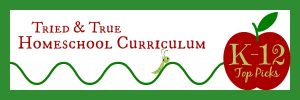
Early Elementary Top Picks (K-2)
Upper Elementary Top Picks (3-5)







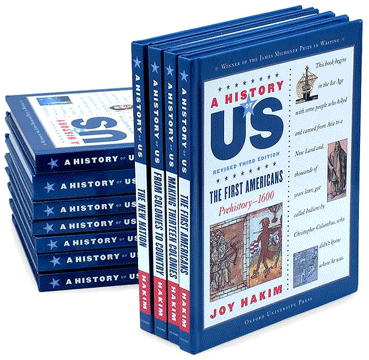






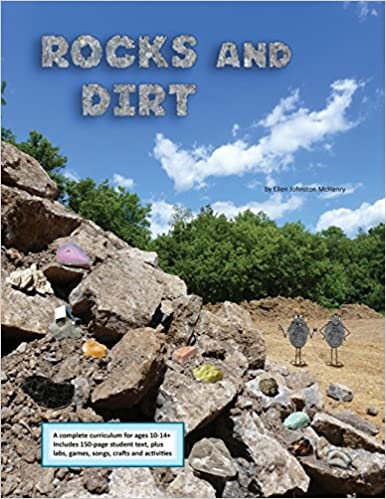

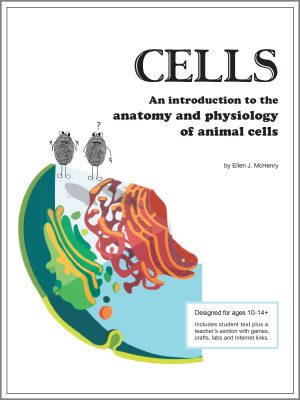
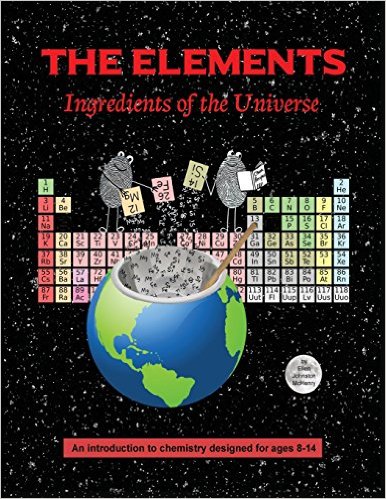
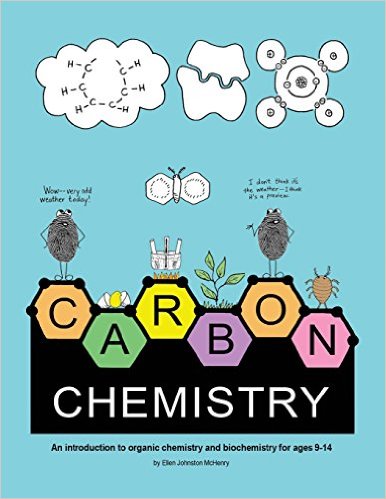
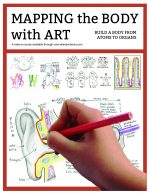



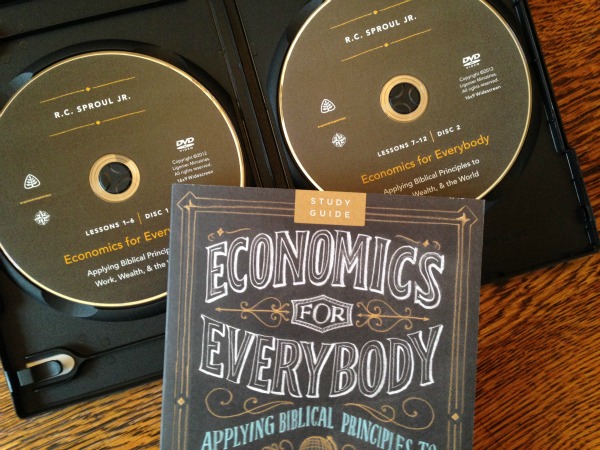



I’m so glad you posted this. I’ve already got Diana Waring’s Ancient Civilizations and the Bible and the psychology course you mentioned is one of the three that’s on my list to check out. Off to read both reviews now!
Just ordered the LLATL for American Lit. Thanks for the suggestion and thanks for sharing at Finishing Strong!
I really think you’ll love it! 🙂
Wow. Nearly identical to my choices for my 9th graders! I am reassured….. (0:
Thank you for the curriculum ideas! We also did Apologia Biology and loved it!
Found you from Carol Top’s website – thanks for your tips! I am using Saxon & Apologia – and I’ve been using a wonderful curriculum for k-8th that I’ve loved (MFW). I’m not sure I’m sticking with it through high school – not because I haven’t loved it – but I am still looking at what will work for him in history, language arts, etc. without the “full box”.
Thanks for visiting, Ashley! I hope you have as much fun planning for high school a I do!
Although this information was helpful…I am feeling lost and overwhelmed. First time homeschooling and first high schooler! Would all of the basic classes/books you listed need to be completed her freshman year? Do these include lessons?
Jeanette, the list you’ve found on this post is just some of the very favorite curriculum I’ve used during the entire span of high school. I would suggest taking a look at the state high school requirements where you live and building your freshman year with that as a framework. For instance, most freshman in KY tend to take English 1, algebra 1, biology, some sort of history, a foreign language, and an elective.
What are your auggestion for an 11th grader that is taking all honors and AP classes thia year, but we want to homeschool her and her other three siblings? She is done with regular math as she was a year ahead in math on middle school. She takes honora science as well all her high school years. Extremely bright daughter that wants to get into a top college like University of Michigan. How about SATs how do i prepare her for those? Please help. A mom that wants to stop all the liberal teachings that are indoctrinating our young kids in the schools.
Miriam, I would really need to have a discussion with you to give appropriate advice. However, I can encourage you here to think about what AP and honors classes she is enrolled in currently and try to find curriculum to use at home along the same topics. There are CLEP courses you could consider, dual enrollment classes at community colleges, and “regular” homeschool curriculum that is already written at high levels (Apologia science is an example.) I would also contact the University of Michigan to ask what THEY want to see from her for 11th and 12th grades and take that into serious consideration. You can easily find SAT prep courses online, too. You can do this!
Hi Cindy,
Thank you for responding! We have decided to go for it. A bit overwhelmed, as I am new to all of this. I would love to speak to you directly to see what you would suggest for my 11th grader. I have her schedule of all the classes she will be taking if she were to go to public school. Just need some guidance on where to start. Thank you for the encouragement, much appreciated. Not sure what is the best way to contact you directly? If you have the time to help this newbie.
Miriam, I used to offer consults via Skype, but my time is just too short these days to fit them into my schedule anymore. I’m sorry! Feel free to ask another question here about where to start and I’ll attempt to give you a decent answer. 🙂
Hi Cindy,
She is taking two AP courses, Chemistry and World History, what would you suggest for material or would be the equivalent of those courses for home school? Also, Honors Trig and Pr-Calculus for math and Honors Spanish, she can take honors English but wants to at least have one class that isn’t honors. What are your suggestions on those? She is taking an accounting class as a college course in which I am back and forth about her taking that course as she does not want to major in business. Thank you for responding on her, means a bunch to me!
Miriam, my best suggestion is for you to search “AP homeschool high school” on Google. There are just so many potential options for you that you will want to find what works best for your daughter. For instance, regular Apologia science textbooks are already advanced and can prepare a student well for AP exams. HSLDA and other entities offer online AP courses that you might consider (https://academy.hslda.org/homeschoolers). This article may be useful to help you plan your own AP courses (https://medium.com/@lisa_davis_21488/what-every-savvy-homeschooler-needs-to-know-about-taking-ap-classes-and-exams-4483dc2638a6). Good luck!
Thank you Cindy. I’ve purchased your books for gifted homeschoolers and lessons to jump into this journey. I’ve been doing research about AP classes here in Michigan. If you have any other suggestions on the other classes I’ve mentioned on curriculum for my eldest daughter. Please do make suggestions. I need any and all the help for her. Thanks again!
We’re almost to high school and I so appreciate this list! Thank you immensely for saying what is liberal and not. We have been using Mystery of History and volume 4 has lots of “anti-america” in it, which shocked me as it’s a Christian curriculum! These options you mentioned are new to me so I’ll have to look at them!
Could this potentially count as a US History credit AND a World History Credit? Thanks!
Jennifer, I’m not sure which curriculum you’re referring to, but most of the history curriculum I’ve suggested can be used for various credits depending on how you use them. 🙂